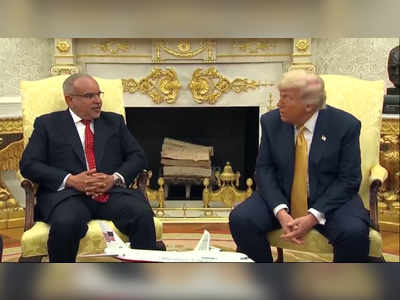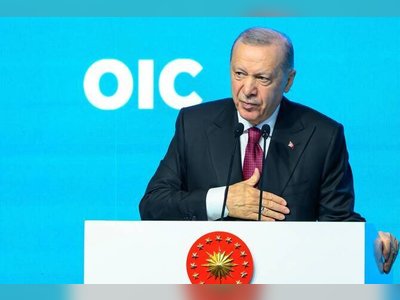
Saudi Arabia's Healthcare Sector Transformation: Unlocking $15-27 Billion in Economic Value with AI by 2030
Saudi Arabia's health-tech sector is undergoing a significant transformation through artificial intelligence (AI), which is forecasted to unlock between $15-27 billion in economic value for the medical sector by 2030.
This can be achieved by automating up to 40% of healthcare tasks, increasing efficiency, and reducing manual workload.
The digital transition aligns with Saudi Arabia's goal of becoming a regional technology hub, with the medical sector being a key beneficiary.
Crown Prince Mohammed bin Salman has emphasized the potential of this revolution, stating that AI and the Internet of Things can bring immense benefits and spare the world of many disadvantages.
Nadine Hachach-Haram, a surgeon and co-founder of Proximie, discussed the transformative impact of AI on Saudi Arabia's healthcare sector in an interview with Arab News.
She highlighted how AI can improve patient safety, communication, and service efficiency by automating administrative processes, minimizing errors, and optimizing efficiency.
The Saudi Arabian government is fostering AI adoption through initiatives like the National Data Bank and cloud infrastructure, enabling public-private sector collaboration.
AI and machine learning are revolutionizing patient care and healthcare service efficiency in the Kingdom as part of the Saudi Health Sector Transformation Program.
The Ministry of Health in Saudi Arabia is implementing a strategy under Vision 2030 to improve medical care access and modernize facilities.
Proximie, a global healthcare platform, is leading this shift through the SEHA Virtual Hospital, which uses AI to triage caseloads and remote scan interpretations.
This helps overcome geographical constraints, enhance patient safety, and share medical expertise across the country.
The hospital, which can treat over 400,000 patients a year, has already supported cardiology surgeries at regional hospitals, reducing the need for patient referrals and travel.
The text discusses how AI and remote technology are improving healthcare access and care in Saudi Arabia.
Noura Saleh, a 70-year-old woman from Tabuk, received urgent surgery following stroke-induced heart failure with the help of SEHA Virtual Hospital's cardiology team providing remote guidance through Proximie.
Rania Kadry, co-founder of Almouneer, predicts that AI will significantly impact medical diagnostics, treatment planning, and personalized medicine in Saudi Arabia over the next decade.
The text discusses the expected benefits of Artificial Intelligence (AI) in healthcare.
These benefits include improved patient outcomes, reduced healthcare costs, enhanced efficiency, and increased access to healthcare services in rural areas through AI-driven telemedicine and remote-monitoring systems.
AI will also be integrated into healthcare administration processes to optimize resource allocation and improve overall management.
The text acknowledges patients' concerns about data privacy and trust, but suggests that clear communication about the benefits of healthcare innovation and knowledge-sharing may encourage patients to embrace the use of their health data.
The text discusses the anticipated impact of AI integration in healthcare administration, specifically in Saudi Arabian hospitals.
Kadry mentions the potential use of AI-powered predictive analytics systems to optimize resource allocation and enhance service delivery by forecasting healthcare needs based on patient data.
Saudi Arabia's commitment to health tech and AI innovation is emphasized, with plans to allocate 2.5% of its GDP to research and development, focusing on aging and chronic diseases.
The launch of the Hevolution Foundation, a $20 billion initiative dedicated to advancing human health and extending life expectancy globally, is also highlighted.
The use of AI technology in healthcare in the Arab world is still developing but has great promise to improve patient outcomes.
The digital transition aligns with Saudi Arabia's goal of becoming a regional technology hub, with the medical sector being a key beneficiary.
Crown Prince Mohammed bin Salman has emphasized the potential of this revolution, stating that AI and the Internet of Things can bring immense benefits and spare the world of many disadvantages.
Nadine Hachach-Haram, a surgeon and co-founder of Proximie, discussed the transformative impact of AI on Saudi Arabia's healthcare sector in an interview with Arab News.
She highlighted how AI can improve patient safety, communication, and service efficiency by automating administrative processes, minimizing errors, and optimizing efficiency.
The Saudi Arabian government is fostering AI adoption through initiatives like the National Data Bank and cloud infrastructure, enabling public-private sector collaboration.
AI and machine learning are revolutionizing patient care and healthcare service efficiency in the Kingdom as part of the Saudi Health Sector Transformation Program.
The Ministry of Health in Saudi Arabia is implementing a strategy under Vision 2030 to improve medical care access and modernize facilities.
Proximie, a global healthcare platform, is leading this shift through the SEHA Virtual Hospital, which uses AI to triage caseloads and remote scan interpretations.
This helps overcome geographical constraints, enhance patient safety, and share medical expertise across the country.
The hospital, which can treat over 400,000 patients a year, has already supported cardiology surgeries at regional hospitals, reducing the need for patient referrals and travel.
The text discusses how AI and remote technology are improving healthcare access and care in Saudi Arabia.
Noura Saleh, a 70-year-old woman from Tabuk, received urgent surgery following stroke-induced heart failure with the help of SEHA Virtual Hospital's cardiology team providing remote guidance through Proximie.
Rania Kadry, co-founder of Almouneer, predicts that AI will significantly impact medical diagnostics, treatment planning, and personalized medicine in Saudi Arabia over the next decade.
The text discusses the expected benefits of Artificial Intelligence (AI) in healthcare.
These benefits include improved patient outcomes, reduced healthcare costs, enhanced efficiency, and increased access to healthcare services in rural areas through AI-driven telemedicine and remote-monitoring systems.
AI will also be integrated into healthcare administration processes to optimize resource allocation and improve overall management.
The text acknowledges patients' concerns about data privacy and trust, but suggests that clear communication about the benefits of healthcare innovation and knowledge-sharing may encourage patients to embrace the use of their health data.
The text discusses the anticipated impact of AI integration in healthcare administration, specifically in Saudi Arabian hospitals.
Kadry mentions the potential use of AI-powered predictive analytics systems to optimize resource allocation and enhance service delivery by forecasting healthcare needs based on patient data.
Saudi Arabia's commitment to health tech and AI innovation is emphasized, with plans to allocate 2.5% of its GDP to research and development, focusing on aging and chronic diseases.
The launch of the Hevolution Foundation, a $20 billion initiative dedicated to advancing human health and extending life expectancy globally, is also highlighted.
The use of AI technology in healthcare in the Arab world is still developing but has great promise to improve patient outcomes.
Translation:
Translated by AI











